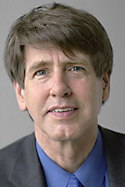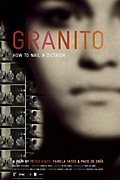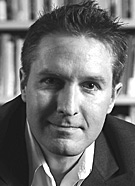Larry Cox, the executive director of Amnesty International USA, headlines Lawrence University’s special month-long series of events focused on human rights issues around the world.
The program — “Engaging Human Rights” — will feature speakers and award-winning films, including the Wisconsin premiere of the documentary “Granito.” All events are free and open to the public.
“Our Scarff Visiting Professorship has a distinguished 20-year history dealing with international issues of the day, but the ‘Engaging Human Rights’ series is a new direction for us,” said Provost David Burrows. “We hope it will highlight many different facets of the worldwide challenge of human rights across disciplinary boundaries on the campus and reach those beyond it in the Fox Valley community. In conjunction with the Povolny Lecture Series, which will feature several presentations on human rights, this should be a great opportunity for further learning about this important and critical issue.”

Cox, who has led Amnesty International USA since 2006, opens the series Tuesday, Oct. 4 at 7 p.m. in the Wriston Art Center auditorium with the address, “Making ‘Hope and History Rhyme’: Moving Forward in the Global Fight for Freedom and Dignity.”
His talk will examine how the unexpected and powerful mass uprisings in Tunisia, Egypt and Libya, among others, not only removed some of the world’s most entrenched and repressive dictators, but also issued challenges to the conventional wisdom, particularly in the West, on the nature of the global fight for human rights and how it is best advanced. According to Cox, human rights advocates in the United States need to move beyond merely seeking to assist those fighting for freedom and dignity in the Arab world and begin to apply the lessons learned from them to human rights work both at home and abroad.
Cox has spent his career advocating for human rights. In addition to Amnesty International, he has served as executive director of the international organization Rainforest Foundation, which works to protect the rights of indigenous peoples in the Brazilian Amazon and spent 11 years as senior program officer for the Ford Foundation’s Human Rights unit, where he focused on the promotion of international justice and the advancement of domestic human rights.
Other scheduled events in the series include:
• Oct. 11 — “The Churches and Human Rights in Latin America.” Alexander Wilde, distinguished visiting Scarff professor and senior scholar at the Woodrow Wilson International Center for Scholars in Washington, D.C., examines the role of and contributions by churches in the fight for improved human rights in Latin America. Wilde, a 1962 Lawrence graduate, spent six years as the director of the Washington Office on Latin America (WOLA), a nongovernmental organization concerned with human rights and U.S. foreign policy. He co-edited the 1989 book “The Progressive Church in Latin America.” 7 p.m., Wriston Art Center auditorium.
• Oct. 23 — “State of Fear: The Truth About Terrorism.” Documentary film about the violence had engulfed Peru during the 1980s and ‘90s during the regime of President Alberto Fujimori. 12 noon, Warch Campus Center cinema.
 • Oct. 23 — “Granito: How to Nail a Dictator.” Part political thriller, part memoir, this 2011 documentary spans four decades in search of details that can be used to hold accountable those responsible for the genocide of more than 200,000 people at the hands of Guatemalan military and paramilitary soldiers. , 7 p.m., Warch Campus Center cinema.
• Oct. 23 — “Granito: How to Nail a Dictator.” Part political thriller, part memoir, this 2011 documentary spans four decades in search of details that can be used to hold accountable those responsible for the genocide of more than 200,000 people at the hands of Guatemalan military and paramilitary soldiers. , 7 p.m., Warch Campus Center cinema.
• Oct. 24 — “Granito: How to Nail a Dictator.” The film’s director, Pamela Yates, and producer, Paco de Onis, will be on hand to conduct a question-and-answer session following a screening of the film. 7 p.m., Warch Campus Center cinema.
• Oct. 25 — “The Reckoning: The Battle for the International Criminal Court.” An epic account of the new International Criminal Court’s struggle to prosecute perpetrators — however powerful or concealed they may be — of crimes against humanity, including indicting Sudan President Omar al-Bashir, issuing arrest warrants for Lord’s Resistance Army leaders in Uganda and putting an infamous Congolese warlord on trial. The film’s director Pamela Yates and producer Paco de Onis will lead a discussion following the screening. 7 p.m., Warch Campus Center cinema.
• Oct. 30 — “Blood Diamond.” Set against the backdrop of Sierra Leone’s civil war in the 1990’s, the story follows an ex mercenary from Zimbabwe and a Mende fisherman joined in a common quest to recover a rare pink diamond that can transform their lives. 3:30 p.m. and 7:30 p.m., Warch Campus Center cinema.

• Nov. 1— “Lessons Learned from Conflict Diamonds in Sierra Leone, or Missed Opportunities.” Greg Campbell, award-winning journalist and author of the book “Blood Diamonds: Tracing the Deadly Path of the World’s Most Precious Stones (which inspired the 2006 Oscar-nominated film “Blood Diamond”) discusses his recent return to Sierra Leone to assess the country’s progress 10 years after the end of a brutal civil war waged for control of its vast reserves of diamonds. How has Sierra Leone fared since it could finally put its natural resources to use for its citizens? Have its leaders learned from the past? Have its diamonds become a blessing or do they remain a curse? 7 p.m., Wriston Art Center auditorium.
• Nov. 8 — “One for the Road.” A performance of Nobel Award-winning playwright Harold Pinter’s story of an unnamed dictatorship during the late years of the Cold War performed by invited professional and student actors and directed by Timothy X. Troy, J. Thomas and Julie Esch Hurvis Professor of Theater and Drama at Lawrence. Pinter wrote the play to support a human rights campaign of PEN International. An open discussion will follow the performance. 8 p.m., Cloak Theatre, Music-Drama Center.
Founded in 1847, Lawrence University uniquely integrates a college of liberal arts and sciences with a world-class conservatory of music, both devoted exclusively to undergraduate education. Ranked among America’s best colleges, it was selected for inclusion in the book “Colleges That Change Lives: 40 Schools That Will Change the Way You Think About College.” Individualized learning, the development of multiple interests and community engagement are central to the Lawrence experience. Lawrence draws its 1,520 students from 44 states and 56 countries.